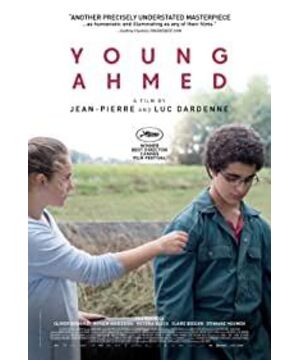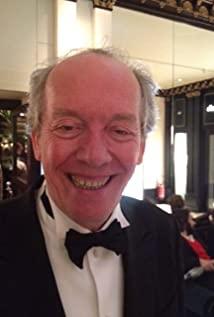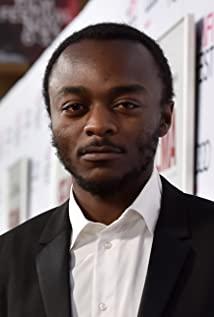At the end of "Young Ahmed", Ahmed, who fell from a height, beat him with a murder weapon to plead for help. His teacher heard the sound and rushed to help him. The touch of the fingertips forms an almost perfect narrative loop, and all of this seems to imply to the audience that all the religious-related taboos in Ahmed's eyes before could not match his close encounter with death.
Unlike previous work by the Darney brothers, which focused on immigrants, underclassmen and unemployed workers, they chose to portray a religious radical as young as thirteen. But after watching the whole film, we will inevitably feel confused. The director's shallow taste of religious issues makes us unable to see the full picture of Ahmed, that is, how he became an extreme Muslim. In the depiction of his upbringing, we seem to be able to find some evidence: his mother's alcoholism, his father's absence, his sister's open clothes, his cousin's sacrifice in the "jihad"... But whether these are enough to constitute his religious fanaticism, is it enough? How much kinetic energy to promote his obsession with assassinating the female teacher?
In fact, it is not uncommon to show the unpleasant behavior of the protagonist in the previous works of the Darney brothers. In "Rosetta", Rosetta designs to frame the boy who loves her in order to get a job; Bruno in "Children", when he learns that his girlfriend has given birth to a child, instead of trying to take care of the child, he wants to sell it Kids exchange money; Cyril in 'Boy Bike' not only robs but stabs his guardian. It is difficult for the audience to like and identify with the actions of the protagonists in Darnay's works from the very beginning, but perhaps this is also the effect that the Darnay brothers are pursuing. An objective attitude to think about the cause and effect of things. This kind of image writing, which is almost harsh to reality, may be corroborated by the words of realist theorist Krakauer, that "reality can only be understood by starting from the extreme."
The reason why "Young Ahmed" was not treated as a complete religious film, to discover the complex reasons behind extreme religious behavior, and how a group of radical groups represented by Ahmed was brainwashed, lies in its essence. The full authorship in the images of brothers-in-law, that is, the display of the surrounding environment is only to explain the motives of the protagonist, the human nature behind the motives, and the portraits of the characters are what these two masters of realism have always adhered to.
For this reason, we can see from their perseverance that Ahmed's stubborn character has the shadow of Rosetta and Cyril; when portraying Ahmed's family relationship, the difficult father-son relationship in "A Promise" is re-emerging. floating in front of the eyes. Some people think that "Young Ahmed" is the attack version of "The Bicycle Boy", and in "The Bicycle Boy", we have already experienced the three texts of "Son", "Child" and "Lorna's Silence". emotions are mixed. The interspersed between these texts is not self-repetition in the conventional sense, but a high degree of refinement by the Dane brothers after observing the appearance of all beings, and the "Dane Moment" is revived at the end of each work.
At the same time, Ahmed carried religious teachings beyond his age to fully comprehend. Although all believers will feel and be inspired by the transcendence of religion, Ahmed, at the age of thirteen, is still too hasty in his understanding of the concept of women in the teachings and paganism, as well as in dealing with life and death issues. Of course, the director did not look at Ahmed from a moral high ground. Instead, he chooses to present his daily life with a simple and natural head-up lens, allowing the audience to discover a variety of human possibilities in his daily life.
"The Qur'an" has a clear stipulation on cleanliness, "what is clean is appropriate, and what is dirty is forbidden". It can be said that "cleansing" runs through Ahmed's religious path. From the very beginning of the film, the director arranged for Ahmed to refuse for the first time. He refused to shake hands with the female teacher. He also believed that the teacher's teaching of Arabic in the form of popular songs was blasphemy against the Koran. Ahmed naturally accepted it. The extremist ideology of the imam who advocated martyrdom on the Internet began to "deliberately" plan and assassinate the female teacher. So far, we seem to be able to understand Ahmed a little. He just has a superficial interpretation of the teachings. The act of assassination is only against the many impure things in this world. Death, as Ahmed's social worker said, is just a Bitten by a mosquito.
After the first failed assassination attempt, Ahmed was sent to a juvenile detention center, where he was truly out of the family and into life for the first time. Milking and feeding small animals on the farm gradually freed him from an absolute binary worldview. Although during this period, especially after being licked by the puppy, Ahmed kept repeating the action of washing his hands, and the "unclean thing" in his heart appeared again. The farmer's daughter's favorable impression of him made him even a little shaken about religion. Although this good feeling didn't last long, but at the moment when the farmer's daughter encouraged him to take off his glasses, he first consciously experienced the blurring of the world, from clear to blurred, this transition to some extent Above is a metaphor that pulls Ahmed from the black and white world back to the complex reality. Can Ahmed finally realize that maintaining the faith in his heart cannot be achieved simply by completing a so-called assassination operation.
Therefore, at the end, Ahmed shouted "Mama" after falling from the building. At this moment, he returned to the posture of a child, and retrieved the basic and human things in people. His coming-of-age ceremony used "unclean" act against the "uncleanness" of the world. And "Forgive Me" is more like the possibility of self-redemption that young Ahmed is trying to explore in this religious road.
View more about Young Ahmed reviews










